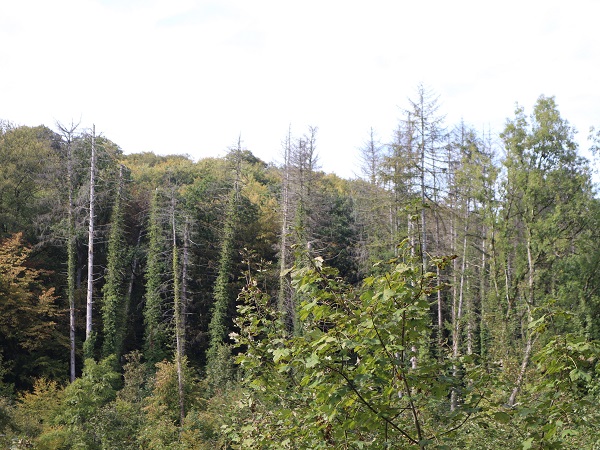 Credit: MECDD
Credit: MECDD
Luxembourg’s Ministry of the Environment, Climate and Sustainable Development and the Nature and Forest Agency have released the 2023 phytosanitary inventory, revealing an environmental crisis exacerbated by climate change.
According to the ministry and the Nature and Forest Agency, Luxembourg’s forests’ health is deteriorating. Luxembourg’s government is implementing a series of measures aimed at preserving and rejuvenating the country's forest ecosystems.
Since 1984, the Nature and Forest Agency has been conducting the phytosanitary inventory, an assessment of forest health. Through systematic sampling across the nation's forests, this annual survey monitors changes, identifies impacted species, assesses risks to forest ecosystems and gauges overall resilience. The data gathered guides strategic decisions in forestry and environmental policy, playing a crucial role in forest preservation.
In 2023, forestry experts scrutinised 1,176 trees across 51 sampling plots throughout Luxembourg's woodlands. These assessments occur yearly during the same period, from 20 July to 15 August. Each tree's health is evaluated based on leaf deficit in the functional crown, considering both general vitality and accidental foliar losses due to factors such as caterpillar attacks. These observations enable the categorisation of damage classes and provide insight into the state of the forest.
The findings from the 2023 phytosanitary inventory revealed a persistent degradation of forest health, evident since 2019. Notably, there was a 1% decrease in the proportion of trees showing no damage (class 0). The majority, 55%, fell into the moderate to severe damage category (class 2). 12.3% of the studied trees were in an advanced state of decay or are already dead (classes 3 and 4). The authorities emphasised that these figures underscore the urgent need for action to protect Luxembourg's forests.
The ministry and the Nature and Forest Agency have opted for a multi-faceted approach to address the forest crisis. Key measures include:
- new forest laws aiming to provide a robust legal framework to safeguard forest functionality, biodiversity, and vitality while promoting the forest economy:
- financial aids to support forest owners through initiatives like Klimabonus Bësch and aid for sustainable forest management, with an emphasis on enhancing ecosystem resilience and carbon sequestration;
- the Nature Pact which aims to encourage municipalities to adopt measures that strengthen forest resilience, biodiversity, and carbon sequestration, even in urban areas;
- the National Plan for the Protection of Nature (PNPN3), focused on restoring forest ecosystems, improving biological diversity, and bolstering carbon sequestration and storage;
- the National Forestry and Accounting Programme (PFN2), still under development, aims to preserve and restore Luxembourg's forests while supporting the timber industry and forest owners;
- third National Forest Inventory (IFN3) aims to provide surveys with dendrometric data and insights into overall forest health;
- mapping forest biotopes at a national scale to track changes over time;
- assisting forest owners in selecting tree species best suited to their sites, considering climate change.
According to Luxembourg’s Minister for the Environment, Climate and Sustainable Development, Joëlle Welfring, “protecting our forests means protecting our future in Luxembourg.”








